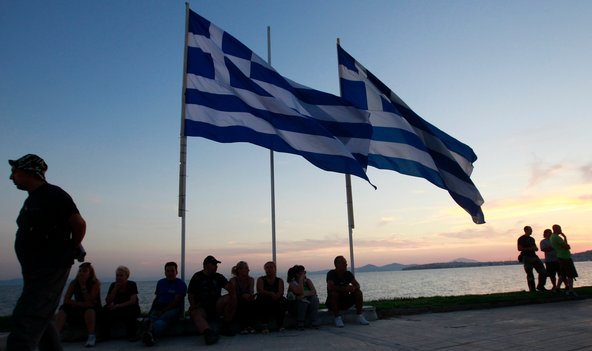Amid some of the most violent demonstrations in Greece in months, and after 14 hours of debate, the coalition approved the measures, 153 to 128. Several governing lawmakers broke ranks to oppose them and 18 members voted present, the equivalent of a blank vote, including 15 from the smallest coalition party, Democratic Left, which opposes the package. There was one abstention.
But the Socialists, whose leadership has staked its credibility on supporting the politically toxic austerity program despite opposition from its political base, were hit hardest. On Thursday, a seventh member of the governing coalition’s Socialist Pasok Party defected, after six others were expelled from party for opposing the measures. One from the conservative New Democracy party was also expelled.
The measures — including sharp cuts to pensions, salaries and social services, as well as tax increases and increases in the retirement age to 67 from 65 — are expected, but not guaranteed, to persuade Greece’s foreign creditors to unlock around $40 billion in aid that the country needs to meet expenses.
A vote on the 2013 budget to activate the austerity package is expected late Sunday.
In presenting the austerity measures, which total $23 billion over four years, to Parliament, Mr. Samaras acknowledged that the new cuts to pensions and salaries were “unfair,” but added that Greece was bound by the terms of its agreement with creditors.
“A lot of what we’re voting on today are measures we should have taken a long time ago,” he said, adding that they would be “the last, the last” such cuts. Future “adjustments,” he said, would come from a crackdown on tax evasion and public-sector waste.
Mr. Samaras, however, is the third prime minister to promise the “last cuts” since Greece asked for a foreign bailout in 2010. The deep cuts, which have helped Greece’s economy shrink 25 percent in recent years, are undermining the country’s social and political stability — and the government’s ability to carry out the structural changes.
“You can’t rebuild institutions when you’ve cut down the salaries of people who work for them,” said Alexis Papahelas, the managing editor of the Kathimerini daily. “That’s the big problem the government and the country are facing.”
On the eve of the vote, nearly 50 employees of Greece’s central bank resigned to protest the deep cuts to public-sector salaries, while on Wednesday, Greece’s Supreme Court ruled that cuts of up to 30 percent in judge’s salaries would violate the Constitution.
Parliamentary staff also threatened Wednesday to resign over their salary cuts, leading Mr. Samaras to consider invoking executive authority to force them to stay on the job, according to a government official not authorized to speak publicly.
Greece’s troika of foreign lenders — the European Commission, European Central Bank and International Monetary Fund — have demanded that Greece reduce its budget deficit in exchange for more aid.
Yet few believe that the measures will help improve the country’s economic health.
“Telling a whole people that they have to commit collective suicide to save the debt is not a policy,” Zoe Kostantopoulou, a member of Parliament from the leftist Syriza opposition party, said in an interview, expressing a sentiment growing across the political spectrum.
“The reason why we’ve seen the economy implode much more rapidly than thought is that they grossly underestimated the impact that fiscal austerity of this magnitude would have on the Greek economy,” said Simon Tilford, the chief economist at the Center for European Reform in London. “Additional austerity is going to compound that weakness.”
Mr. Tilford added that the slump in the economy was also making it harder for Greece to meet the troika’s demands to reduce a mountain of debt. “The whole strategy for Greece has failed,” Mr. Tilford said. “It’s led to collapse in the Greek economy and the ballooning of debt so it’s an abject failure.”
Stella Dimitrakopolou, a 29-year-old graphic designer who donned a surgical mask as protection against tear gas in Wednesday’s demonstration, agreed.
“These measures are inhumane,” Ms. Dimitrakopolou said. “The young generation has no future, and older people have no money and the measures do not help society economically.”
Niki Kitsantonis contributed reporting.
Article source: http://www.nytimes.com/2012/11/09/world/europe/defections-shake-greek-coalition.html?partner=rss&emc=rss

